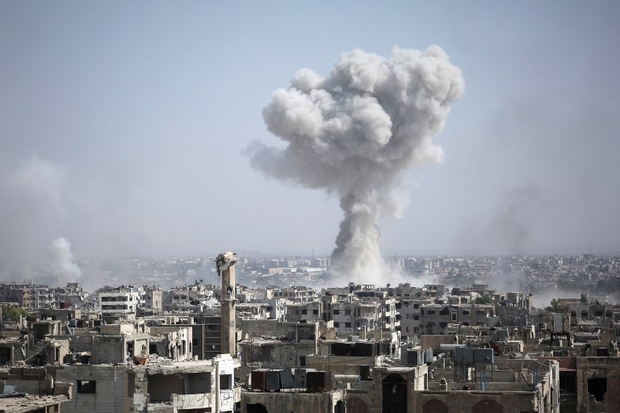Syrian army pounds rebel areas near Damascus after Russian brokered truce
- Putin signs Syria base deal, cementing Russia's presence there for half a century
- Syrian rebels reject Russia's proposal for safe zones
- Blast hits Syrian bus convoy near Aleppo: state media, monitors
- Jets hit Syrian rebel outpost near Turkish border: rebels
The Russian defense ministry said on Friday it had reached a ceasefire that took effect at 21.00 hrs Moscow time (1800 GMT) with Failaq al Rahman, the main Free Syrian Army (FSA) group fending off a two-month widescale Syrian army offensive in Jobar district and nearby town of Ain Tarma.
A spokesman for Failaq al Rahman said both Jobar, which lies some 2 km (1.2 miles) east of the Old City wall, and nearby Ain Tarma on the edge of Eastern Ghouta witnessed army strikes and shelling soon after the ceasefire went into effect.
 |
| Syrian army pounds rebel areas near Damascus after Russian brokered truce |
"After the first few hours ... there were many violations midnight they dropped barrel bombs and from the morning there have been strikes across the Ghouta," Wael Alwan, spokesman for the group, said.
At least five civilians were killed in the towns of Hamouriya and Zalamka and fighters said there were several case of suffocation from rockets filled with chlorine that were fired at the front lines of Jobar and Ain Terma, he added.
The Syrian army elite 4th Division has been trying unsuccessfully to storm Jobar and residents say the army has retaliated for its heavy losses by shelling residential areas, leaving scores killed and wounded since the campaign was launched.
Moscow said on Friday that the ceasefire meant an earlier one announced last month in Eastern Ghouta now included all the moderate opposition groups in the main rebel stronghold that stretches from eastern to northeastern suburbs of Damascus.
The army has not commented on the latest Russian agreement with Failaq al Rahman whom it considers a terrorist group that threatens the capital. It however says it abides by truces Moscow has brokered.
Many fighters welcomed the ceasefire to help alleviate plight of civilians most hurt by aerial strikes but remain deeply skeptical about Russia's readiness to get the Syrian army to stick to the terms of a cessation of fighting in several de-escalation zones that Russia has already announced
Moscow had already began to deploy military police in several areas across Syria such as in southwestern Syria where "de-escalation" zones had been announced.
"This shows the lack of seriousness by the Russia to put pressure on the regime," Alwan added.
Failaq al Rahman said the Syrian army bombardment appeared to be an attempt to wreck a ceasefire deal whose main points included deploying Russian military police along the frontline, the release of detainees and allowing humanitarian goods into the besieged Eastern Ghouta.
"It seems the regime wants to take advantage of the opportunity to take revenge for its big losses during their many attempts to storm the Ghouta before the Russian military police enter to disengage the forces," Alwan told Reuters.
Outnumbered and outgunned, local rebels fortified in elaborate tunnels and deploying ambushes have repelled repeated attempts to storm their stronghold, inflicting dozens of losses on the army since the campaign began.

